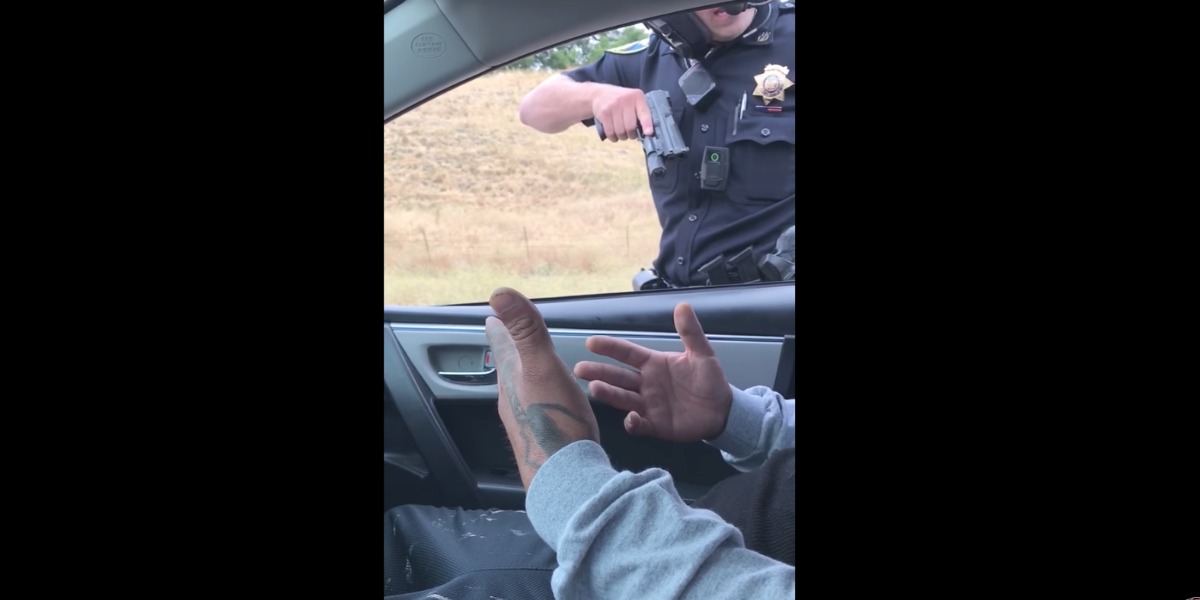By now you may have seen it: the latest footage of police misconduct (thankfully, not lethal), in which a California cop held a car passenger at gunpoint for nine minutes during a routine traffic stop.
Videos by Rare
The story starts out blandly enough, with the car being pulled over for speeding on the highway. The officer gets the driver’s paperwork and walks back to his motorcycle to write the ticket. When he returns, the cop says the passenger was reaching under his seat in a suspicious manner. The passenger says he was just getting more requested paperwork off the floor.
RELATED: How the overcriminalization of everything is endangering ordinary people
Whichever account is true, what happened next is the cop pulled his gun on the passenger, even though the stop was “cordial” up to that point, and this conversation ensued, per the Washington Post:
“Wow,” the passenger says in the video, laughing. “We’re looking for the f*****g paperwork, bro. Oh my God.”
“I understand that,” the officer replies. “Don’t move, all right?”
The passenger sounds indignant as his hands remain on his lap. “Why are you still pointing that gun at me, bro?” he asks the officer. “Why are you still pointing the gun at me, though? Record this s**t. Why are you still pointing the gun at me, bro? My hands are right here.”
“I understand,” the officer says.
“No, you don’t understand,” the passenger protests, as the officer tells him to relax. “No, I’m not going to relax. Get the f*****g gun off me.”
A woman in the car asks the officer: “Is that really necessary? His hands are both out.”
After nine long minutes, more police arrived, and the impasse ended. The police department involved has reviewed — but not released — the officer’s body camera footage and maintains the cop acted appropriately.
Needless to say, the people held at gunpoint don’t agree.
Central to the debate this video has reignited is the question of police safety: Was the cop reasonable in his apparent belief that his life was at risk? Of course, it is always possible that a passenger who has shown no prior signs of aggression during a traffic stop has suddenly decided to engage in unprovoked murder, but the relevant consideration here is whether it is probable.
The indisputable answer is it is not, because police in America are historically safe.
In fact, “Every decade since the 1970s has seen a drop in the rate of fatalities, shooting deaths and felony killings of police. Even in absolute terms, killings of police officers are on the decline. Fewer than half as many officers are being killed each year, on average, compared to the 1970s.” And, crucially, these improvements are not only due to improvements in medical technology and body armor. Though certainly those help, police “are also being attacked less frequently.”
It’s also important to note that of the officers who have died on the job in recent years, many have been killed accidentally, not because they were attacked. For example, per the Officer Down Memorial Page, American police have suffered 75 line of duty deaths in 2017, a slight decrease compared to last year. Gunfire was the single largest cause of death, but vehicular accidents (car, boat and motorcycle) are the second most common, and various illnesses together make the third largest category.
RELATED: It’s good to see police push back on Trump’s support for brutality, but most didn’t go far enough
I mention all this because these facts matter in a case like this. They help us assess whether this officer’s actions were reasonable, or whether they were — as I believe — another unfortunate case of police misconduct based in fear that is made dangerous by inadequate training in de-escalation.
While researching for this post, I ran across a must-read article by a police officer named Louis Hayes which explains what went wrong on that California highway. Hayes runs through the statistics about record police safety like those I’ve shared above, emphasizing how important it is that police know the truth. If they don’t, if they are instead “inundated with the message that anyone, anywhere and at any time” could try to murder them, Hayes asks, “is it any surprise that [he] or other police officers might be fearful on the job?”
That, he concludes, is why better education and training is so necessary:
Simply out, police training in America is in dire need of an overhaul. Too many departments still ignore emotional intelligence and behavioral analysis aspects of threat recognition. We need implicit bias training and community outreach. Our training spends too much time and effort on the “exceptions” and not enough on the “rules.” Police training should emphasize slow-down strategies and tactics that allow for police officers’ critical thinking skills to complement, and, if necessary, override, emotions like fear or prejudice.



